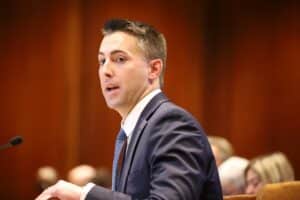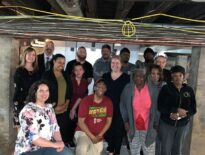
Sen. Brendan Crighton, sponsor of highway toll legislation at Thursday's hearing, said the Bay State's transportation woes translate into "serious challenges for our business community." Photo by Sam Doran | State House News Service
Supporters of increasing fees on ride-hailing trips, expanding highway tolls, and charging drivers for every mile they travel made their cases to lawmakers Thursday, each pitching their respective proposal as a necessary source of revenue to address the state’s growing transportation needs.
Several key House members have hinted that they are likely to include an increase in the state’s 24-cents-per-gallon gasoline tax in a transportation revenue bill that Speaker Robert DeLeo is eyeing for release next month, but other ideas put on the table during a Transportation Committee hearing on Thursday could supplement that revenue stream.
Rep. Thomas Stanley warned his colleagues that over the long term the gas tax will be insufficient to meet roadway and public transit needs. Rising fuel efficiency in vehicles, he said, means that even the same frequency of driving will result in motorists purchasing less gas, generating less revenue for the state.
Instead, Stanley suggested Massachusetts embrace legislation (H.3010) he co-filed with Rep. Tricia Farley-Bouvier to create a pilot program to test fees based on the miles people travel rather than the amount of gas used.
That system, often referred to as vehicle miles traveled or VMT, would help ensure that Massachusetts has the funding available to make upgrades to its aging public transit systems and roads and bridges that require maintenance or overhauls, Stanley said.
“Without a reliable long-term revenue source, the state will fall further behind properly maintaining our transportation infrastructure,” he said.
The hearing took place against a backdrop of warnings from the Baker administration that traffic has reached a “tipping point,” concerns from businesses about the economic impact of transportation challenges for their employees, and widespread frustration over public transit disruptions from commuters.
“The system is not working today for constituents in any of your districts around the state,” Transportation for Massachusetts Executive Director Chris Dempsey told the committee. “There’s different reasons in different parts of the state, but the system is not working. Your body is really needed, an action from your body is needed soon to try to dig us out of that hole we’re in.”
“It feels a little bit like Groundhog Day, sitting in this chair, talking about a transportation crisis, urging financing mechanisms that are needed to meet our statewide needs,” Lizzi Weyant, government affairs director for the Metropolitan Area Planning Council, told lawmakers Thursday.
Two proposals, both filed by Lynn Democratic Sen. Brendan Crighton, would look at overhauling the state’s toll system and expand those charges to many more drivers than currently face them.
The first bill (S.2060) would instruct the Department of Transportation to report on the feasibility of implementing all-electronic tolling on state and interstate highways “not currently subject to a toll,” taking a look in particular at tolls along the state’s borders.
The second (S.2062) would expand tolls to stretches of Interstate 93, Interstate 95 and Route 2 in an attempt to apply equal charges to drivers across the greater Boston region. That bill also calls for implementation of dynamic “peak pricing” where the toll varies based on roadway conditions.
Another Crighton bill would increase the fees on ride-hailing companies such as Uber and Lyft. The state currently assesses a flat 20-cent fee on each ride through those services, regardless of length. The legislation (S.2063) would change that to a scaled percentage of the overall fare.
Under the proposal, the fees would be 4.25 percent of the total fare paid for shared rides and 6.25 percent of the fare for a single passenger trip.
MAPC’s Weyant said that Massachusetts has lower fees on transportation network companies or TNCs than many other areas and does not do enough to incentivize shared rides. She said the state also does not collect enough data from the trips, which Gov. Charlie Baker targeted in a bill he filed in July.
Lyft spokesman Campbell Matthews said in a statement that the company believes higher fees alone will not make a significant impact on congestion.
An MAPC report in July said the MBTA missed out on more than $20 million in foregone fare revenue from passengers who jumped ship onto TNCs.
House leaders initially said they wanted to debate and vote on a transportation revenue package this fall, but with only a week remaining for formal sessions in 2019 DeLeo decided last month to push it back until January.
Transportation Committee Co-Chair Rep. William Straus told reporters after the hearing that he would not rule out any revenue ideas – including all of those that were on Thursday’s agenda – from the House’s plans, save for a legislative increase to MBTA fares.
The committee’s Senate chair, Joseph Boncore, said his chamber would likely wait to take up the topic until after an informal Senate working group examining transportation wraps up its work. He declined to put a date on that, but said it would be “as soon as the work’s done.”




 |
| 

